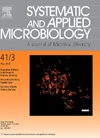The term "systematic microbiology" refers to aspects of the systematics of microorganisms including biotechnologically or ecologically important fungi, to studies on genealogical and phylogenetic relationships, and to comparative physiology and biochemistry relevant to research on microorganisms. The term "applied microbiology" covers aspects of agricultural, food, industrial, and ecological microbiology, e.g. the distribution of microorganisms in natural and man-made environment. Accordingly, original papers are published from the following fields of microbiology: 1. systematics: e.g. new descriptions and revisions of taxa. 2. morphology, physiology and genetics: comparative studies, particularly concerning classification or phylogenetic assignment of considered organisms. 3. applied microbiology: all aspects of agricultural, industrial, food, and sewage microbiology. 4. ecology: all aspects of soil, water, and air microbiology including the structure and function of microbial communities, their role in the material cycle and how they are effected by human activity.
